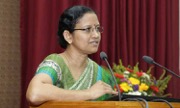A State Level Conference on Comprehensive Nursing Management of Stroke was organized on October 2017 at the Sree Chitra Tirunal Institute for Medical Sciences and Technology (SCTIMST), Thiruvananthapuram, Kerala, India. This event was hosted as a part of World Stroke Day.The conference was jointly organized by Comprehensive Stroke Care Program- SCTIMST, Nursing Division- SCTIMST and the Non-Communicable Diseases (NCD) Division, Kerala State Health Services.
Nurses are a vital part of a stroke care team. Nurses have essential roles like rapid assessment, monitoring, coordination and education of patients with stroke. The general aim of this one-day conference was to sensitize nurses regarding the evidence based comprehensive stroke management.

The specific objectives of the conference were; to review the basic concepts in the nursing management of patients with stroke, to brief the evidence-based guidelines in reducing the door to needle time, to discuss the intensive nursing care interventions and,to refine critical thinking, reasoning and clinical judgment of clinical nurses. The conference was facilitated byuse of powerpoint presentations, video demonstrations, case studies and problem-solving case scenarios. The conference covered various aspects of stroke care like; diagnosis and imaging of stroke, establishing a comprehensive stroke care unit, intravenous thrombolytic therapy, mechanical thrombectomy, cardioembolic strokes, intensive care, carotid revascularization, dysphagia management, rehabilitation, discharge planning and secondary prevention. The sessions were taken by stroke physicians, stroke care nurses, physiotherapists and speech therapists.

The conference came to an end with an interactive panel session where, contemporary issues in stroke care practice were discussed. Around 350 nurses from rural and urban as well as from public and private sector hospitals attended the meeting. The nurses included those working in primary care settings, rural clinics, neurological units and stroke centers.
Dr. M. D. Nair, Professor and Head, Department of Neurology, SCTIMST inaugurated the conference and Dr. Bipin K Gopal, Asst. Director, Kerala State Health Services felicitated the event.Dr. PN Sylaja, Professor of Neurology and In charge of Comprehensive stroke care program, SCTIMST was the chief patron of the conference. Ms. Valsala Kumari, Nursing officer and Dr. Saramma P P, Lecturer in nursing were the organizing chairpersons. The meeting received financial support from the Health and family welfare department of Government of Kerala.














































